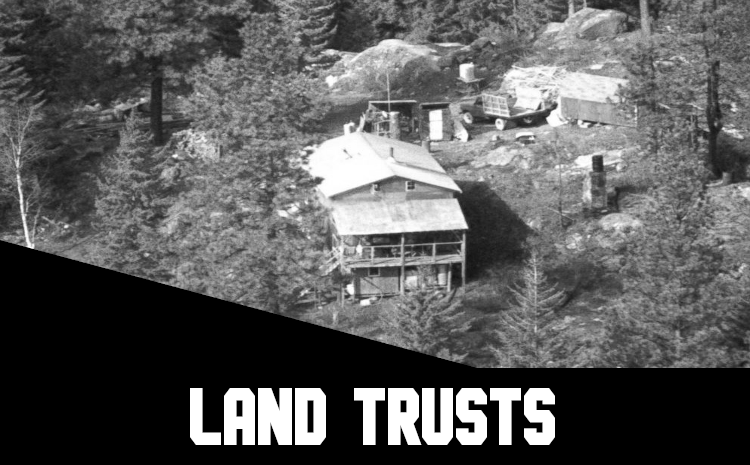DISCLAIMER: This article contains general legal information. It is not legal advice. All legal information in this article is true as of the time of writing. However, the law may change over time. To obtain legal advice about a specific legal issue that may impact your personal situation, speak to a licensed attorney. If we mention specific groups or individuals, we don’t do so to mock, shame, or disavow them. We sympathize with all political prisoners who share our worldview.
This article is part of a series that the American Futurist is releasing on legal topics that impact revolutionaries. A big problem revolutionaries face is getting into legal trouble because they don’t know the law. This project aims to alleviate this problem.
A problem we have noticed over the years is people in the movement failing to maintain their anonymity when buying land. For those who don’t know, when land is purchased in America, information about the land’s titleholder is recorded at the county clerk and recorder’s office of where that land is located. This is done, among other reasons, to establish who is the rightful owner of that land and to determine if there are any liens or encumbrances on the land. The titleholder’s information is also in the public records, meaning it is included in public databases for anyone to see. This makes it easier for police to harass you, Antifa to dox you, and kike lawyers from anti-White NGO’s to steal your land through lawfare.
Recently, land conveyances by several figures and groups were discovered by the SPLC and Antifa, causing the FBI to later harass them.1 This problem goes back decades in the movement. The KKK, WAR, and the Aryan Nations had their land stolen from them after the SPLC and the ADL won lawsuits against them. These anti-White NGO’s knew these properties belonged to their respective groups partly because their group leaders were named as title holders in the public records. However, there is a way to obscure the title of a land owner: placing the title of your property in a land trust.
A land trust is a legal instrument that separates the holding of title and the “power of direction” over a property.2 Essentially, someone who places their property in a land trust retains all the powers to control and manage the property while placing title of ownership to another entity. A big advantage of using land trusts is that it keeps the property holder’s name out of the public records. Instead, the name of the trustee title holder is in the public records. It is insufficient to buy land through a corporate entity because most states require corporate entities to disclose the names and contact information of the entity’s directors and officers in their formation documents, compromising anonymity. A lawyer can help you transfer title of the property to a land trust to keep your name out of the public records.
Placing title of your property in a land trust is perfectly legal. Real estate developers and landlords do it all the time to prevent holdovers and to hide their assets from potential litigators. Valuing your privacy is a valid concern that any lawyer will understand. However, because there are tax, personal liability, and other considerations to keep in mind when contemplating this arrangement, one should speak with a licensed attorney to decide if this is right for their personal situation.
When buying property, hire a lawyer and tell them that you want to protect your privacy by placing title of your property in a land trust. Don’t tell the lawyer about your beliefs or any groups you may be involved with. If you do, most lawyers won’t want anything to do with you. Setting up a land trust may cost you an extra couple hundred or thousand dollars, depending on who’s your lawyer. But the peace of mind that the anonymity of title can bring goes a long way.
DO NOT make the name of your title-holding land trust related to you, your ideology, or your group in ANY WAY. Our enemies aren’t totally stupid. If you get cute and name the title holding trustee entity “1488 Berghof Trust”, they’re going to be on your trail. This was a mistake made by Roman Wolf, the founder of The Base. He bought land only using an anonymous Delaware LLC called “Base Global”, the same name as his group.3 The LLC’s address was registered under a New Jersey P.O. box, which narrowed the search but was enough to still conceal his identity. But the LLC’s tax affidavits, which are required to show state and local taxes were paid, included his old New Jersey address, linking the entity to him. He only bought the property through an LLC, which as we discussed above, is insufficient for anonymity purposes. He did a lot of things right, but this was a small mistake in an otherwise impressive concealment effort.
Land trusts can not only be used to protect the “base camps” of any hypothetical groups you may be involved with, but also to protect your house or homestead from greedy kike lawyers. Tom Metzger had his house stolen from him after the SPLC’s lawsuit against WAR. He may have benefited from having his house in a land trust to obscure his house’s ownership. It also helps not to tell the entire world about your property. Many of those who recently had their land holdings exposed and later taken from them told the entire world about their land on social media. Most already know this, but it’s worth repeating: When you post online, it isn’t just our guys who are seeing it. It’s also feds, kikes, Antifa, journalists, and other bad actors. Keep your cards close to your chest and avoid drawing unwanted attention.
Protect yourself and your property by considering a land trust. A land trust will protect you most from Antifa and journalists, who mostly rely on public records to dox and harass people. If the feds really wanted to find your information, they have other search tools at their disposal, like subpoenas and warrants, that Antifa and journalists don’t have. But as we’ve seen in the past (RAM, AWD, The Base, Terrorgram, etc.), the feds usually start investigating someone after Antifa and journalists tip them off first. Therefore, using a land trust to keep your name out of the public records can still be beneficial. Speak with a lawyer to determine if a land trust is best for your personal situation.
Hail Victory!
FOOTNOTES:
1: See https://archive.is/TeuSl; https://archive.ph/ciLrR; https://archive.ph/wx0su
2: See Robinson v. Chicago Nat’l Bank, 32 Ill. App. 2d 55, 58
3: See https://archive.is/K7u86

